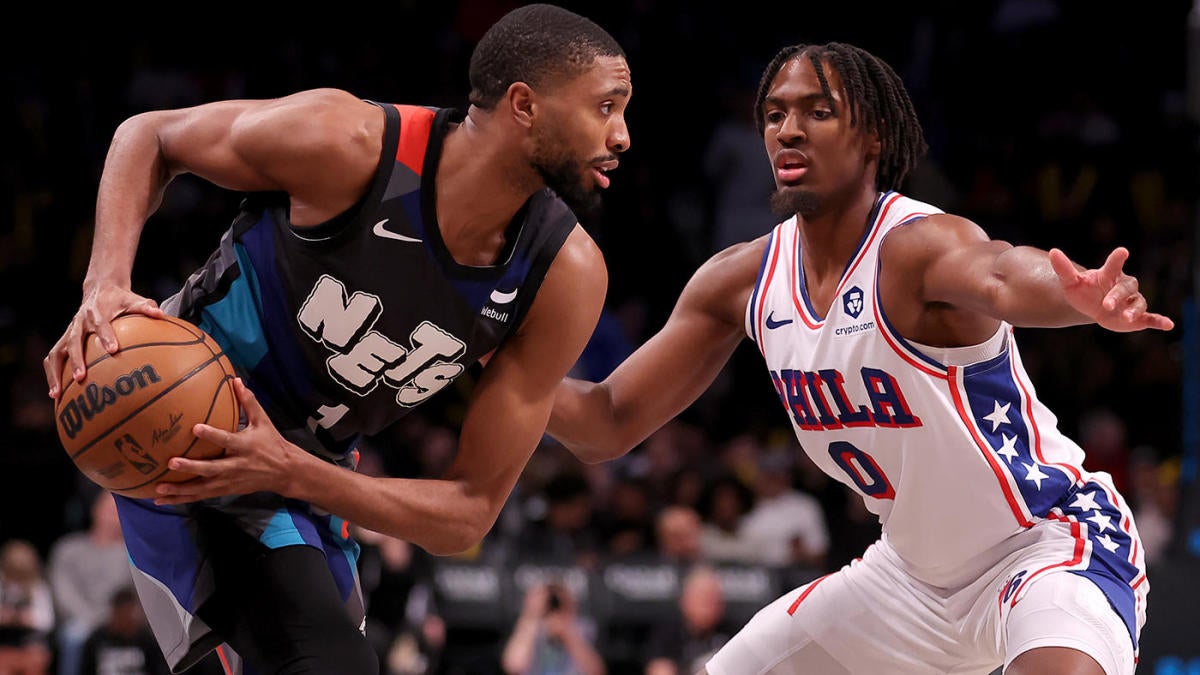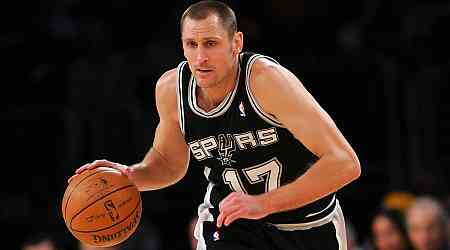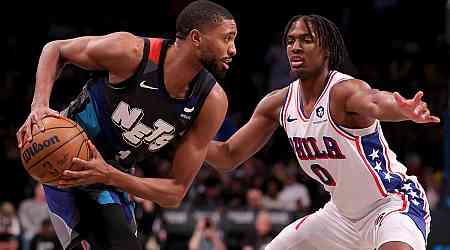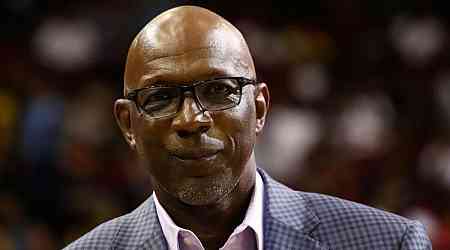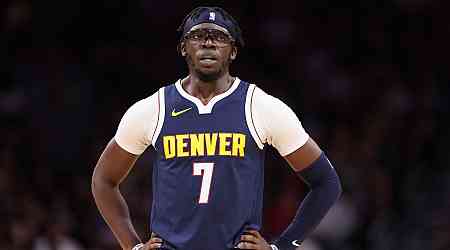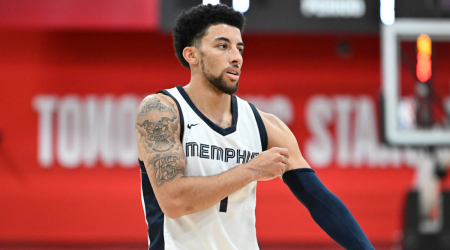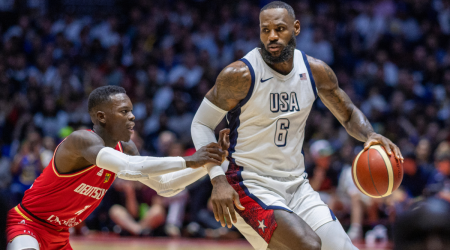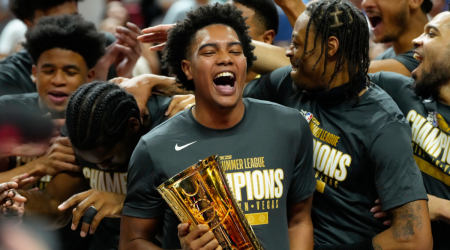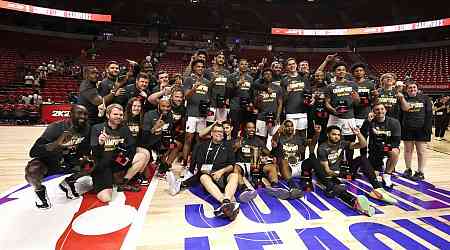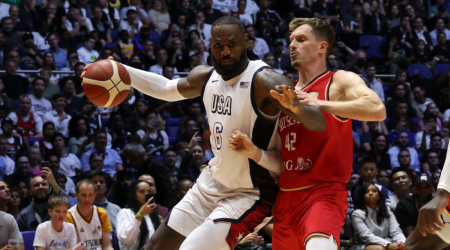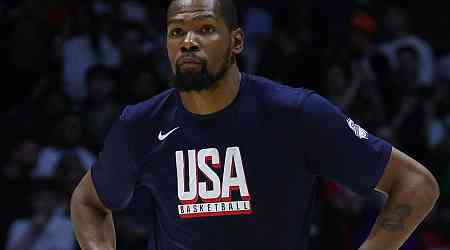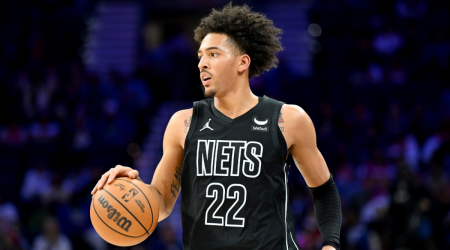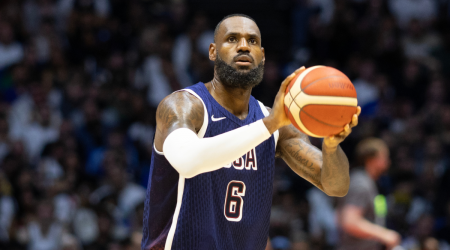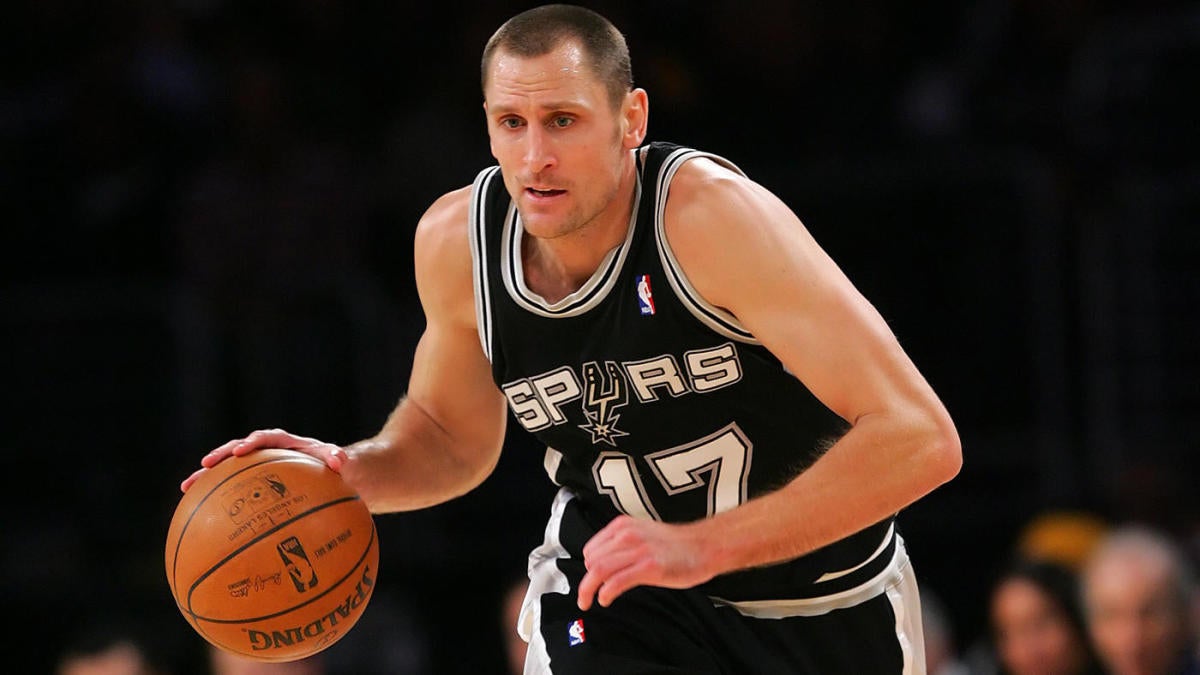
There are two types of teams in the Eastern Conference. Type No. 1 is the Boston Celtics. The best team in the NBA. The reigning champions. The most balanced starting five the NBA has seen in decades. Ideally, every team in the Eastern Conference wants to be the Boston Celtics. There can sadly only be one Boston Celtics.
And then there's type No. 2: teams that are not the Boston Celtics. Every type No. 2 team's theoretical goal should be beating the Boston Celtics. The only thing separating these teams is timelines. Either you're trying to beat the Boston Celtics next season, like, say, the Knicks, 76ers and Bucks, or you're trying to beat the Boston Celtics three or four years from now, when Jayson Tatum and Jaylen Brown will be a bit older (though still in their primes) and the supporting cast will likely have changed meaningfully.
But make no mistake -- the Boston Celtics are the measuring stick here. They are the best team in the NBA today, and barring something unforeseen, they will be among the best teams in the NBA for years to come. Any aspiring Eastern Conference contender, either today or in the future, has to reckon with the reality that the Boston Celtics are standing in their way.
So as we grade the offseasons for all 15 teams in the Eastern Conference, know that the single most important component of our rubric will be how each of them has set themselves up to deal with the Boston Celtics. We'll order our teams by grade here, starting at the top and working backward.
Philadelphia 76ers: A
There's no easier path to an "A" offseason grade than adding a superstar without giving anything up in return. The Philadelphia 76ers didn't just do that when signing Paul George. If you trace the transaction back to its origin -- the James Harden trade to the Clippers last season that officially cleared the space they'd need to sign George -- they actually walked out of the George addition having improved their overall asset base. In that Harden trade, the 76ers got control over two future first-round picks from the Clippers in 2028 (unprotected) and 2029 (top-three protected, via swap rights). Those picks look pretty valuable right about now!
George's fit in Philadelphia is about as clean as you'll ever find within a star trio. There's one guard (Tyrese Maxey), one forward (George) and one center (Joel Embiid). All three can shoot. Two are high-end defenders. They play at different speeds and can function in different styles depending on which of them are on the court at any given time. The 76ers may have the best trio in the NBA right now.
Daryl Morey did a stellar job of filling out the supporting cast. Caleb Martin's four-year, $35 million deal is one of the best values of the offseason. Kelly Oubre Jr. was underpaid at the minimum last season, but he is still probably underpaid at the cap room mid-level exception this season. Andre Drummond has been a proven fit behind Embiid in the past and he's one of the few backup centers available at his price point that can easily scale into a starting role when necessary. Kyle Lowry will be good value at the minimum, no matter how old he gets. Philadelphia cleverly used KJ Martin's Bird Rights to create a free trade chip. No notes here. The 76ers did everything right.
Brooklyn Nets: A
The Mikal Bridges trade made sense for the Knicks, as we'll soon cover. But it was a complete game-changer for the Nets. Bridges is not a star. He will never be a star, as last season proved pretty close to incontrovertibly. There was no realistically attainable star the Nets could have gotten to pair him with before his cheap contract ended in 2026. They had to move him. At best, they were going to have to pay a non-star a star salary two years from now. At worst, they were going to lose him for nothing. Ian Begley's reporting suggests he would have gone to the Knicks either way. Despite their uncomfortable position, the Nets managed to extract five first-round picks and one first-round swap for a player who didn't want to play for them and has never made an All-Star Game. It's not an exaggeration to suggest that this was the third-best trade in the history of this franchise, trailing only the acquisitions of Julius Erving and Jason Kidd.
Those five Knicks picks, already, were enough to get the Nets a good grade for the offseason. Getting their own picks in 2025 and 2026 back from the Rockets was even bigger. Now the Nets have a direction. They can tank properly for two years, hopefully find a star to build around, and then use those picks from the Knicks (as well as the leftovers from other teams they've collected over the years) to put the right talent around those players. The Nets went from an aimless lottery team sending its picks to Houston to one of the NBA's scarier rebuilders in a single stroke.
They've managed the fringes well thus far. They cleverly structured Nic Claxton's four-year, $97 million extension to decline in salary each year. It won't even be worth 10% of the salary cap in its final season. They took a wise swing on a former top-10 pick in Ziaire Williams, and new coach Jordi Fernandez is a well-known developer of talent. There's still work to be done here. Cam Johnson and Dorian Finney-Smith should be traded before opening night. Even if there might be better offers on the table in February, nothing is more important to the Nets than the value of their own picks. Getting any remotely valuable veterans off of the team as quickly as possible should be the priority. But those are easy enough trades to make. Brooklyn's long-term outlook is substantially brighter today than it was in May and June. This offseason was an enormous victory for the Nets.
Boston Celtics: B+
The good news for the Boston Celtics is that they are already the Boston Celtics. We covered this above. The whole goal in the East right now is beating Boston. The Celtics are the only team that doesn't have to beat the Celtics, which already gives them a substantial leg up, but the Celtics confirmed that advantage by doubling down on, well, being the Celtics.
Everyone is getting paid here. Jayson Tatum got a supermax extension. Derrick White got a four-year, $125.9 million extension. Sam Hauser got a four-year, $45 million extension. All of these deals are team-friendly. Boston's financial outlook is pretty clear for now. The Celtics will keep this team together for two years, which will be their two allowable second apron years before draft picks start getting dropped to the end of the first round. And then, in the summer of 2026, they will let the then-31-year-old Kristaps Porzingis walk in free agency to duck back below the line. With everyone else under contract, they should still be quite good. Next year's team is going to be quite good because it is more or less identical to last year's. The only two members of the 2024 roster that are currently unsigned are Oshae Brisset and Svi Mykhailiuk.
So why don't the Celtics get an "A?" Because Wyc Grousbeck is selling the team. That's probably not going to affect the team on the floor this year, but it matters. Boston's ownership has been among the most stable in the NBA over the past two decades. The Celtics might get another great owner. They might not. The wrong owner can torpedo a winner in so many ways. What if the next owner wants to put his stamp on the roster as aggressively as Mat Ishbia did? What if he doesn't want to pay enormous luxury tax bills? Boston is still the championship favorite. There's a real chance the Celtics emerge from this era with multiple championships. But that ownership question is lingering here just enough to knock the offseason grade down a peg.
New York Knicks: B+
It's fair to have some misgivings over the Bridges price. As fun as the Villanova reunion is going to be, five first-round picks and one first-round swap for a non-All-Star is a bit daunting. Keep the following in mind while evaluating that trade:
- Bridges is going to be severely underpaid over the next two seasons, in which he is owed around $48 million in total. Getting him on the team surely played a part in compelling Jalen Brunson to leave a possible $113 million on the table to re-sign at a discount this offseason. Bridges himself is also reportedly likely to do the same, and the Knicks probably had some idea of that before they made the trade. The Knicks are generating a significant amount of surplus value from a salary perspective because of this trade, and managing the cap has never been more important than it is today because of the second apron.
- A player's trade value has never been less tied to his perceived talent than it is today. Brandon Ingram is a significantly more "talented" player than Bridges. Unlike Bridges, he's made an All-Star team. The Pelicans are desperate to trade him. Nobody wants him. Today, a player's trade value is driven as much by salary, durability and fit as it is raw production. We've covered the financial element of the deal. There's nothing to cover when it comes to durability because Bridges has literally never missed an NBA or college game. Fit is just as much of a certainty. An elite 3-and-D wing that can create his own shot when he isn't asked to be the primary driver of his team's offense can help any team. Bridges was so expensive, in part, because all 30 teams would like to employ him. That just isn't true of a lot of players many would consider more traditionally talented.
- Typically, trades of this size involve the win-now team giving away significant player value in addition to draft capital. The Suns gave up Bridges in addition to all of their picks to get Kevin Durant, for example. The Cavaliers gave up Lauri Markkanen and Collin Sexton in the Donovan Mitchell trade. The Knicks gave up no player value in this deal. At best, Bojan Bogdanovic was going to be a deep bench player for them. He may also have been waived to save money.
So, was Bridges an overpay from a value standpoint? Maybe, but it made perfect sense in context. This is what you hoard picks to do. The Knicks have a legitimate chance to win the championship right now, and unlike many of their competitors, they are going to have a sustainable financial structure that keeps them in the hunt for years to come. If that's the outcome of the trade, who cares about the value proposition of a single trade?
The Knicks are a center away from getting an "A," but the center situation is concerning. Isaiah Hartenstein may have been the second-most important Knick during the playoffs. Now he plays for the Thunder. Mitchell Robinson is a capable starter when healthy. The Knicks absolutely cannot rely on him to be healthy. Is Julius Randle capable of playing backup center? Are they going to use Precious Achiuwa in a sign-and-trade to generate the money needed to go get someone? Are they just going to bring Achiuwa back themselves? There are a handful of ways New York could address the center problem. Once Leon Rose has done so, he may well deserve an "A." Until then, it's a B+.
Cleveland Cavaliers: B-
The single most important component of this offseason for Cleveland was securing Donovan Mitchell's signature on an extension. They got it. The Cavaliers might not have gotten the long-term commitment they probably would have preferred, but Mitchell's new deal buys Cleveland at least a year of peace and probably two. That's enough time to potentially reshape this roster into the sort of conference finals contender he's said he wants to play for.
This, of course, raises the question of how exactly the Cavaliers plan to do that, and so far, their approach has been far too conservative. All reports indicated that they did not seriously consider trades for either Jarrett Allen or Darius Garland this offseason. Cleveland could perhaps justify keeping one. There's no universe in which keeping both makes sense in such a wing-heavy league. Allen's cheap contract for the next two years gives him considerable value, and Evan Mobley's postseason success after Allen's injury suggests he's ready to be a full-time center. Yet the Cavaliers, to date, have not added a single veteran to their roster, let alone made progress on any blockbusters.
Maybe the offers weren't there for Garland or Allen this summer. That's reasonable. But the shorter extension Mitchell signed does put a bit of a clock on this core. The deal doesn't have to come now, but if we get to February and Cleveland is a No. 5 seed, the pressure is just going to mount. Nothing that has happened over the past two postseasons suggests that this roster is capable of truly challenging the conference's elite. Maybe Cleveland can spend another year pretending otherwise, but sooner or later, some change is going to have to come.
Kenny Atkinson is an upgrade over J.B. Bickerstaff, and he's a fit for the players in place here. Allen thrived under him in Brooklyn. He's worked with multiple ball-handlers within a pick-and-roll-heavy offense before. But it feels like we're shuffling deck chairs here until either the front-court logjam or the backcourt logjam is addressed. Mitchell's extension is a major win, but without doing anything else, it's hard to give Cleveland too much credit for this offseason.
Milwaukee Bucks: B-
It's not a stretch to argue that the Bucks just signed the best collection of minimum-salary free agents in recent NBA history. The reporting suggests that Gary Trent Jr. could've gotten around $15 million per year from the Raptors. Taurean Prince just outplayed a Bi-Annual Exception contract. Delon Wright is a playoff-caliber defender. It's usually hard to get one meaningful contributor for the minimum and the Bucks just got three. Milwaukee had a dire need for viable NBA players this offseason. The Bucks were simply too thin. They've improved their depth quite nicely with very limited resources.
The Trent signing, in particular, stands out here. He just attempted 11 3's per 100 possessions and made over 51% of his wide-open triples... and he gets to play with Giannis Antetokounmpo? Trent just spent the past few years on a Toronto team that barely used traditional point guards. Now he's back with Damian Lillard, the player who helped establish him as an NBA starter in the first place. When they're healthy, the Bucks are going to be among the NBA's best offenses. That was true without Trent last season and it will be truer with him this season.
The problem here is the same as it was a year ago: there's not much point-of-attack defense to be found here. Wright will help off of the bench. Trent is better than Malik Beasley, but that's not saying much. There were rumblings this offseason that the Bucks wanted to do something to substantially change their playing style. Brook Lopez was in quite a few rumors. Trading him and their 2031 first-round pick probably could have landed them a proven 3-and-D player. They didn't do it. Whether or not something that aggressive made sense is a matter of debate, but the fact remains that Milwaukee is in a conference with Jalen Brunson, Tyrese Maxey and Donovan Mitchell and has no real chance of defending them whatsoever. Maybe the Bucks will be so overwhelming offensively that it doesn't matter. That's pretty realistic given the talent at play here. But the Bucks didn't, and perhaps couldn't, address their single biggest weakness, so that puts an artificial cap on their grade for the offseason.
Orlando Magic: B-
Every individual move the Magic made with their substantial cap space made sense. Kentavious Caldwell-Pope is a perfectly good starting 3-and-D wing. You can never have too many of those. Goga Bitadze, Mo Wagner and Gary Harris were all retained and reasonable deals for backups that are immensely tradable. The Jonathan Isaac renegotiation-and-extension move was a stroke of genius. They got his payday out of the way before their young players got more expensive, and then his contract declined from there. The best per-minute defender in the NBA is set to earn a projected 7.27% of the salary cap during the 2028-29 season. If he stays healthy, that's among the NBA's best contracts. If he doesn't, it's harmless. There is no guaranteed money after the 2026-27 season.
But the Magic didn't really improve. They doubled down on what worked last season, but they didn't add the sort of traditional shot-creating guard or high-volume 3-point shooter that this offense needs to jump to the next level. It's not as though they had to do that this offseason, specifically. Orlando still controls all of its picks and has a ton of tradable salary. The Magic can wait out the trade market and strike when their ideal target becomes available. Patience is a virtue. It doesn't ensure a top offseason grade.
The Franz Wagner extension was a bit much. He would have deserved the max a year from now if the Magic had seen his 3-point shooting improve back to the mean. If he shoots 28% again next season and struggles to create his own looks in the playoffs, this contract looks dangerous. There was no compelling reason to pay Wagner the max right away besides keeping the peace with a key player. Even if the Magic were willing to give him the max this offseason in the end... why not at least try to negotiate a bit in July and August? The contract might be fine. It's probably a slight overpay. Slight overpays are easier to swallow when the process that leads there makes more sense (as in the Bridges trade for the Knicks, for example). The Magic should have played this one a bit more patiently.
Indiana Pacers: C+
There's only one notable veteran swap here. Jalen Smith, a lottery bust-turned-viable reserve, left for Chicago. He was replaced by James Wiseman, a lottery bust the Pacers are hoping to turn into another viable reserve. Indiana is better than most teams at developing players on that track. Just look at how much of their rotation is built around former first-round picks from other teams: Obi Toppin, Aaron Nesmith, and even Tyrese Haliburton fit that mold. Wiseman probably won't be much more than a backup for him, but this is exactly the sort of team that should have taken a shot on him. If nothing else, he's going to enjoy catching lobs from Haliburton.
Otherwise, it was a summer of stability for the Pacers. The biggest move was re-signing Pascal Siakam to a max deal, and Indiana got a meaningful concession out of Siakam when he agreed to sign for four years instead of five. That extra year is pretty important on several levels. It obviously helps the Pacers avoid paying Siakam, an iffy shooter who may not age especially well, max money in his age-34 season, but it also sets the Pacers up to have cleaner books going into Tyrese Haliburton's contract year in 2028-29. By that point, the Pacers will be pick-neutral again, and in all likelihood, they will be looking for a new, younger co-star for the second half of Haliburton's prime.
Toppin's four-year, $60 million deal should age well. That's about right for a high-end sixth man, and if he can increase his 3-point volume while maintaining last season's efficiency (40.3%), it's going to look like a bargain. Andrew Nembhard is eligible for a four-year, $75 million deal as well. Should he sign it, the Pacers will have the bulk of their young core locked up to reasonable deals. Only time will tell if this group can contend in a less injury-riddled conference, but for now, keeping the band together was the right call.
Atlanta Hawks: C+
The value on the Dejounte Murray trade was pretty good, all things considered. Two reasonably valuable first-round picks, a veteran that could probably be flipped for something else of value (Larry Nance Jr.) and a versatile wing two years removed from being a lottery pick himself (Dyson Daniels) is a good price for a player that absolutely needed to be traded. It didn't seem like there was any world in which the Hawks were trading their picks back, so a full-on rebuild was off of the table until at least the 2027-28 season when Atlanta controls its first-round pick again. As far as time-biding strategies go, surrounding Trae Young with a bunch of young wings wasn't the worst idea.
It is way too early to render a verdict on the Zaccharie Risacher pick at No. 1 overall. He might be great. His Summer League performance suggests he's got a ways to go. But Reed Sheppard's Summer League dominance at least begs the question of how seriously the Hawks considered him. Would he have been a poor fit with Young? Probably. That backcourt would be tiny. Who cares? The Hawks are years away from any sort of meaningful winning. If Sheppard was the best player in the class, and thus far, he's probably the front-runner, he probably deserved a closer look at No. 1. Teams like the Knicks, which are championship-ready, can afford to emphasize fit. The Hawks are so far away that talent probably should have been the priority.
It's time to get Clint Capela off of this roster. Onyeka Okongwu needs to start, and Nance should get the backup center minutes while he's on the team. There's probably an offer of at least a bad first-round pick out there somewhere. The Knicks would jump on him in a second if they had an easy way to match money. This is the most pressing business left for the Hawks for now, but it's easy enough to accomplish that it doesn't really impact their final grade.
Washington Wizards: C
Everything from the Hawks section covering the Risacher vs. Sheppard debate applies to the Wizards with Alex Sarr, with the caveat that Sarr, offensively at least, was abysmal at Summer League. He couldn't create his own looks. He couldn't score in pick-and-roll. He looked lost. He obviously has plenty of room to grow, but Washington isn't exactly an ideal locale on that front. Sarr badly needs a real point guard to set him up for easy buckets early for him. His starting backcourt, right now, looks like Jordan Poole and Bub Carrington. Maybe Washington re-signs Tyus Jones to serve as the designated adult in the room for Sarr's rookie year. If that was the goal it probably would have happened by now.
The Deni Avdija trade made sense from an asset-accumulation and tanking standpoint, but he wasn't the sort of player Washington explicitly needed to trade. He's still only 23 and would have been in his prime by the time the Wizards are ready to seriously try winning again. More importantly, he has an incredibly cheap four-year contract. Carrington was a good pick in the lottery and might be enough to justify the move before even considering the second first-rounder Washington is getting, but he's a meaningful loss.
Jonas Valanciunas is a veteran signing who is helpful enough. His contract is cheap, and a traditional big man can be a pretty helpful developmental tool. It's nice to have someone on the floor who's going to consistently box out and set good screens, and he can be flipped for draft capital at the deadline if the right offer becomes available. Saddiq Bey was a very nice bargain signing in part because he's probably going to miss the season with a torn ACL. He won't impact Washington's draft position this year, but he'll be back for pennies on the dollar next season. All in all, it was a by-the-numbers rebuilding summer for the Wizards.
Toronto Raptors: C
Immanuel Quickley's five-year, $162.5 million contract, which can reach $175 million through incentives, looks a bit worse on paper than it is in reality. The number itself is big, but the contract structure is flat, so relative to the cap, it's actually going to get cheaper by the year. In the last season it will pay Quickley less than 16% of the cap, which is decent starter money. The Raptors are betting that Quickley is something better than a merely decent point guard. Are they right? It's possible. His scoring and playmaking volume increased in Toronto without a substantial efficiency dip, which is promising, and he's a good defender for his size. All things considered, it's a fair bet on a young player even if it's a slightly aggressive one.
The same is mostly true of Scottie Barnes on a max rookie extension. Unlike Orlando's situation with Wagner, Toronto more or less had to give it to Barnes. He's a reigning All-Star and the face of the franchise. Even if there are misgivings about his future, and after the season he just had, there shouldn't be. He's just too important to risk alienating. He probably won't make All-NBA this season, so it's likely to be a 25% max instead of a 30% max. It's not exactly harmless if something goes wrong, but it's not the sort of anchor that the bigger maxes can become.
All of this was more or less expected. Quickley's camp had all of the leverage the moment Toronto traded OG Anunoby for him. Anunoby is a better player, but he's guaranteed himself an extra $50 million through his Knicks contract. That gap is about right, given their value on the court. Barnes was a no-brainer. The Raptors neither gained nor lost any core pieces. They made their moves during the season, so the offseason grade was always going to be average.
Charlotte Hornets: C
Snagging Josh Green for free was a nice little maneuver for Charlotte. He's a good defensive guard, and even if he doesn't shoot 3's at the volume you'd like, he at least mostly makes the ones he takes. His contract was small enough to be moved again if necessary, but even if he's just a decent third guard, the value here is fine.
Miles Bridges was an overpay. That has nothing to do with his off-court history (which shouldn't be ignored either) and everything to do with the fact that he has thus far been mostly an empty calories scorer. He's never turned his considerable athleticism into consistent defense. He's a league-average shooter at best. He's a valuable scorer near the basket but he's not nearly good enough at creating his own looks. What was the market for Bridges outside of Charlotte? There may potentially have been sign-and-trade interest, but even that would have required Charlotte's cooperation. It's just not clear where else Bridges could have come close to $75 million over three years. The contract's saving grace is that it declines in salary each year, so at least they're getting the heaviest hit out of the way early.
Detroit Pistons: C-
Give credit where it's due: Tom Gores is willing to spend. He gave Monty Williams a historic contract to coach his team a year ago and fired him when it became apparent a change was needed. Troy Weaver needed to go as well. It's too early to tell how much of an improvement Trajan Langdon will ultimately be, but it's hard to imagine him being much worse.
This offseason wasn't a great start, though. Ron Holland might have been the right pick at No. 5 overall in a vacuum, but the Pistons are doing all of their young players a disservice by pairing them with so many other non-shooters. Holland can't make 3's. Ausar Thompson can't make 3's. Jalen Duren can't make 3's. Cade Cunningham and Jaden Ivey are both average or worse from deep, and they need space to drive with. Separate these players, and they'll all be exciting prospects. Together, they are less than the sum of their parts because they all cramp the floor for one another.
The Pistons took steps to address their shooting woes this offseason, but did so with the wrong players. Who was offering Tobias Harris even the full mid-level exception? Detroit doubled it, albeit on a two-year deal. He was a high-volume and very effective 3-point shooter during his first stint in Detroit, but both his volume and percentage dipped in Philadelphia despite playing with better-supporting talent. Tim Hardaway Jr. is a shooter but not exactly a spacer. He's much more of a heat-check scorer that's going to fire up 3's off the dribble than someone who will enhance the youngsters. Why did Quentin Grimes need to be in the Hardaway trade? It's entirely possible that the Pistons gave up the most valuable player in a trade that the Mavericks needed as a cap dump. There are valuable young players here, but right now, they don't fit together at all. Landgon's priority over the next year needs to be figuring out which of these youngsters are essential and which ones need to be jettisoned to enhance the rest.
Chicago Bulls: C-
Credit where credit is due: the Bulls finally admitted defeat on the DeMar DeRozan-Zach LaVine era. It may have come 18 months too late, but hey, better late than never. Letting go of DeRozan was an absolute necessity if only to preserve their 2025 first-round pick, which is top-10 protected and, ironically, belongs to the Spurs as part of the deal that brought DeRozan to Chicago in the first place. Trading Alex Caruso, while he was still on a valuable, cheap contract, was the right idea as well. The Bulls of the past few years were going nowhere. They had to step back.
But the execution leaves quite a bit to be desired. Let me be the 19,000th person to ask: how did Chicago fail to secure even a single draft pick in the Josh Giddey trade? Caruso was probably the most desirable role player on the trade market and Giddey was just unplayable in the playoffs for the Thunder. Giddey has his virtues, and on a team that lets him fully play point guard with shooting and defenders around him, he might well prove to be a worthwhile base in a Caruso trade. But he's also about to get expensive and only fits on a small number of teams (of which the Bulls, for now, are not one). The Thunder have more first-round picks than they know what to do with. Chicago needed to negotiate a bit harder. This was literally the first trade of the offseason. I'm gonna go ahead and guess Oklahoma City's offer would have at least held until draft night.
Getting a first-round pick from the Thunder might have given the Bulls the draft ammo they needed to dump Zach LaVine. Do you know what else might have helped on that front? Getting an unprotected 2031 first-round swap from the Kings in the DeRozan deal, but the Bulls are so hilariously terrified of the luxury tax despite playing in the NBA's third-biggest market that the Spurs were able to swoop in and steal that swap just for taking on Harrison Barnes. So now, the Bulls are either stuck with LaVine or will have to include the bulk of their own capital to get off of him, which is a non-starter for a rebuilder. Nikola Vucevic is stuck here as well because the Bulls thought paying a backup-level center starter money a year ago made sense.
This might work out for the Bulls in the end. They're bad enough to feasibly be in the mix on lottery night, and Cooper Flagg is going to change the trajectory of whatever team picks him. There might be four or five 2025 prospects that do that. But if the lottery gods do bless the Bulls back onto the right track, it will be in spite of the front office, not because of it. Other than doing the bare minimum of waiving the white flag on the DeRozan era, the Bulls have mismanaged just about every element of their rebuild.
Miami Heat: D
We've spoken a lot in both these East grades and in the Western Conference about the need for a plan. A team needs to have a clear direction. Do the Heat have one at the moment? When you ignore this front office's sterling track record, how different is this Heat offseason from the one the Lakers have been widely criticized for? The Heat are largely bringing back last year's team, with Alec Burks replacing Caleb Martin (a clear downgrade). Since the 2023 Finals, the Heat have also lost Gabe Vincent, Max Strus and Kyle Lowry. Terry Rozier helps, but the sheer talent drain here is considerable. Miami, like Los Angeles, has been a Play-In team two years in a row. Miami, like Los Angeles, is built around an aging forward that doesn't really have time to wait for a deliberate reload.
Let's address the elephant in the room here. While there was no credible reporting suggesting that the Heat seriously considered a Butler trade, there were certainly rumors as a result of Pat Riley's very public hesitance to extend him. That reluctance is reasonable. Butler is 35. He misses 20 games or so every year. He's made one All-Star Game in the past four seasons. His playoff track record is beyond reproach. It doesn't do much good if you're starting every postseason in the Play-In round. Put Butler on a team with a higher floor that can reliably get him to the second round every year and he makes far more sense.
The Heat probably should trade Butler, and they should do it now before his desire for an extension terrifies teams in this second-apron world we now live in. With only two tradable first-round picks at the moment, they lack the assets to get another star. They are already above the first apron, so adding considerable role-player talent is going to be difficult. They're the Heat, so they'll unearth another hidden gem or two on the fringes, but is that going to be enough to offset any possible age-related decline for Butler? Bam Adebayo is still relatively early in his prime. The rest of the role players are largely young. The sensible move here, given Miami's general desirability as a market, should be to turn Butler into assets that can later be flipped for a star on Adebayo's timeline. A younger duo gives Miami's stellar front office time to figure out the rest of the roster. That is time that Butler probably doens't have.
It's dangerous to doubt the Heat (trust me, I know!) Having the best coach and maybe the best front office in basketball gives Miami quite a bit of leeway that other franchises don't have. They've worked their way out of far tougher jams than this. But at present, the Heat look like a Play-In team. They've been a Play-In team two years in a row. They did little to improve their chances of not being a Play-In team next season. Considering Butler's age and this franchise's lofty ambitions, that makes this a disappointing offseason.


















